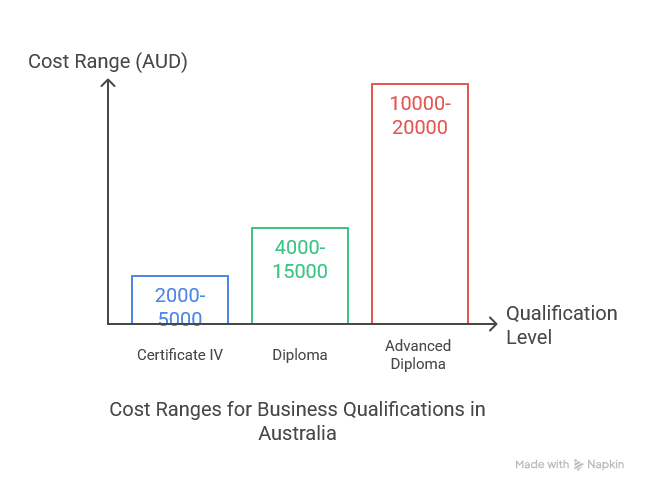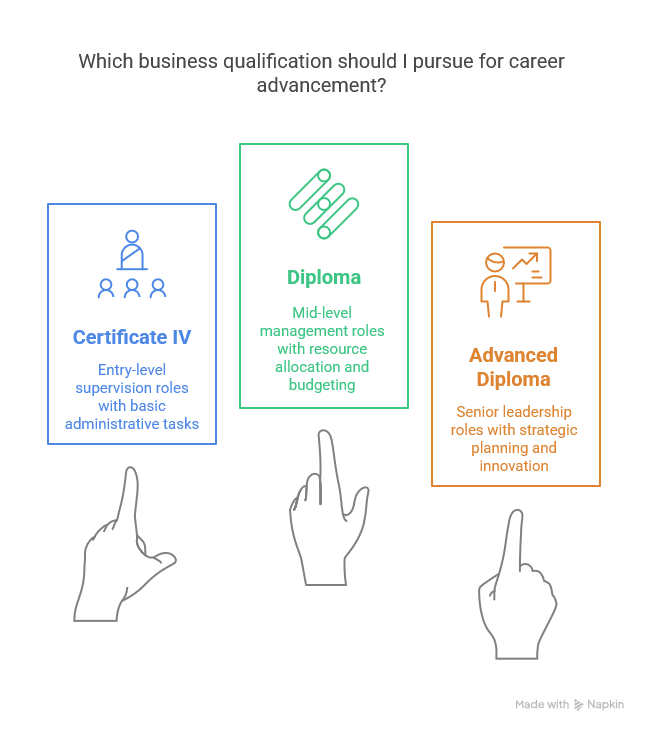Salary outcomes are a core concern for anyone investing in vocational education. A Certificate IV in Business (BSB40120) can help you secure entry-level supervisory or administrative roles, potentially leading to better earnings than a purely uncredentialed position. Yet salaries vary due to industry, location, and your prior experience. This article explores typical pay ranges for roles that commonly require or benefit from a Certificate IV, along with tips for leveraging your new qualification to negotiate higher wages or position yourself for promotions.

Roles Associated with a Certificate IV
Graduates often step into positions like:
Office Coordinator
Overseeing administrative tasks, maintaining records, ordering supplies, and potentially supervising junior staff.
Team Leader
Handling shift scheduling, basic performance feedback, and day-to-day conflict resolution.
Project Assistant
Supporting project managers with documentation, resource allocation, or basic reporting.
Customer Service Supervisor
Leading a small group of frontline service reps, setting service benchmarks, and addressing escalated customer issues.
While these roles don't usually involve high-level strategic decisions, they do require more responsibility than entry-level staff positions. The enhanced skill set can result in a moderate salary bump. According to the Department of Employment and Workplace Relations, many roles in this band range from around AUD 45,000 to AUD 60,000, though some can exceed AUD 65,000 if they carry broader responsibilities or are in high-demand sectors.
Impact of Industry and Experience
Industry heavily influences pay rates. An office coordinator in a tech startup or a growing e-commerce firm might earn more than someone in a small retail business. Additionally, if you were a seasoned trade professional stepping off the tools and into a supervisory capacity, your trade experience could command a higher starting salary than a new graduate with no industry background. Employers value the combination of practical trade knowledge plus formal business training.
In rural or regional areas, salaries might be on the lower side of the national average, but cost of living can also be more affordable. Meanwhile, capital cities like Sydney or Melbourne often offer higher wages, offset by higher housing and transportation costs. If relocation is feasible, chasing roles in industries with notable skill shortages can yield a better pay bracket.
Industry Comparison for Certificate IV Salaries
- Construction & Trades: $50,000 - $65,000 (particularly for those with trade background moving into supervision)
- Technology & IT Support: $55,000 - $65,000 (tech companies often pay premium for administrative roles)
- Healthcare Administration: $50,000 - $60,000 (stable sector with good progression potential)
- Retail Management: $45,000 - $58,000 (varies significantly by size of retailer)
- Financial Services: $52,000 - $63,000 (banking and insurance often offer better entry-level packages)
- Government/Public Sector: $48,000 - $60,000 (typically includes better benefits and work-life balance)
- Hospitality: $45,000 - $55,000 (may include additional perks like accommodation or meals)

Negotiating Pay with a Certificate IV
Having a formal qualification provides leverage in salary discussions. You can point to your newly validated competencies—managing staff rosters, improving customer service protocols, or coordinating small-scale projects. Emphasise how these skills can directly impact the company's efficiency or bottom line. For instance, if you learned to track and reduce office supply costs, you're offering a clear financial benefit to your employer.
If you're already employed, consider requesting a performance review shortly after completing the course. Present examples of how you've applied your Certificate IV learning to improve workflow or reduce errors. For new job interviews, highlight how your formal training sets you apart from candidates who rely solely on ad hoc experience.
Salary Negotiation Strategies:
- Document Your New Skills - Create a portfolio of projects completed during your Certificate IV that demonstrate your capabilities
- Research Market Rates - Use salary comparison websites to know the typical pay range for your target role in your location
- Highlight Industry-Specific Knowledge - Emphasize how your Certificate IV training applies directly to the employer's sector
- Quantify Potential Contributions - Whenever possible, express your value in numbers (e.g., "My process improvement knowledge could reduce administrative time by 15%")
- Discuss Career Pathway - Frame your salary request as part of a longer career development plan with the organization
Progression and Future Earning Potential
A Certificate IV is often a stepping stone rather than a final destination. Some graduates eventually enrol in a Diploma of Business for deeper operational or managerial insight. Others pivot into specialised certificates—like human resources or bookkeeping—that further broaden their skill set. Each additional qualification can unlock roles with greater responsibility and pay.
Even if you don't pursue further formal study, consistently applying and showcasing your leadership and administrative improvements can lead to incremental raises and internal promotions. Many individuals find that after a year or two of proven results, they can aim for roles that might typically require a diploma, leveraging practical achievements to compensate for the credential gap.
Entry-Level Positions (0-1 years)
- Junior Team Leader: $45,000 - $50,000
- Administrative Coordinator: $42,000 - $48,000
- Customer Service Supervisor: $45,000 - $52,000
Experienced Roles (2-3 years)
- Office Manager: $55,000 - $65,000
- Departmental Supervisor: $55,000 - $68,000
- Project Coordinator: $58,000 - $70,000
Career Progression (4+ years)
- Operations Coordinator: $65,000 - $75,000
- Executive Assistant: $65,000 - $80,000
- Small Business Manager: $70,000 - $85,000
Beyond Basic Salary
Remuneration isn't just your annual figure. Some employers offer benefits—like flexible hours, training allowances, performance bonuses, or even profit-sharing for small businesses. These perks can add significant value, especially if they help you continue learning or balance work-life responsibilities.
Moreover, the confidence and competence you gain with a Certificate IV can shape your professional trajectory in ways that aren't purely monetary. Feeling more adept at running a small team or handling a project means you can volunteer for roles that expand your influence, making you more visible to management. Over time, this visibility, combined with proven results, often translates into better positions and higher income.
A Certificate IV in Business isn't just about the immediate salary boost—it's about laying a foundation for long-term career growth. The skills you develop can increase your value to employers, enabling you to progress into roles with greater responsibility and compensation over time.
While the immediate salary boost from a Certificate IV in Business might not rival that of a higher-level qualification, it provides a structured gateway to supervisory roles paying roughly AUD 45,000–AUD 65,000 or more, depending on industry and experience. Success hinges on how well you integrate your new skills into the workplace and communicate their value to employers. By consistently seeking out responsibility and demonstrating tangible improvements, you can leverage the qualification into long-term earnings growth and career development.